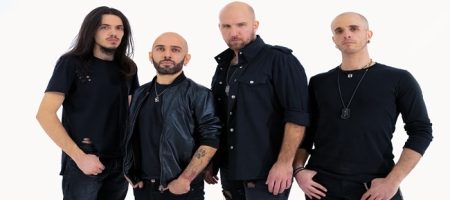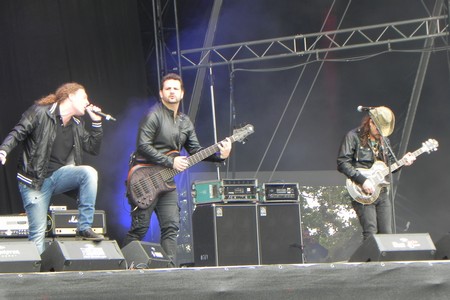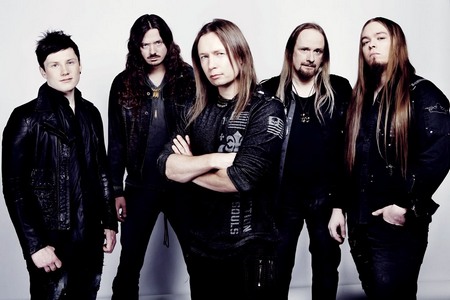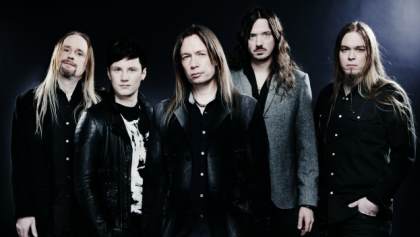Stratovarius – Stepping Up the Game
Sunday, 11th September 2022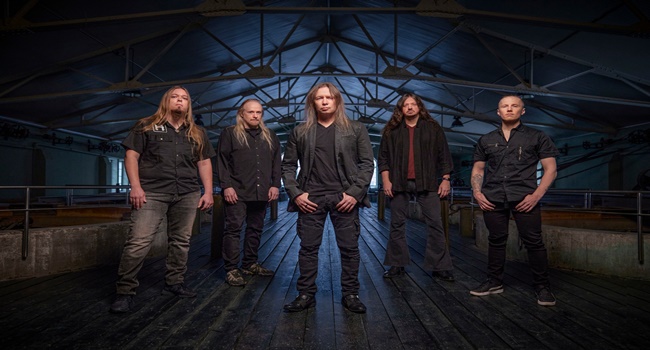
Pioneers of putting power metal on the worldwide map through a series of tremendous records during the 90’s and 2000’s, the post-Tolkki years for Stratovarius are just as exciting to take in. The latest album Survive continues the evolution of these musicians as creative artists, willing to keep one foot in their conventional ways while also exploring some modern tones and touches that present relevancy for the current marketplace. We reached out to guitarist Matias Kupiainen who was happy to explain the long time between studio records, the newer team-oriented songwriting approach to this record, his memories first stepping into this band to replace Timo Tolkki, how the band handles the business end of things internally, favorite records over the years, plus the numerous tours in the works.
Dead Rhetoric: Survive is the latest Stratovarius album – seven years removed from Eternal. How do you feel about the long break between studio records – does it give the band more time to recharge and re-energize your collective creative batteries to approach this set of material in a better frame of mind?
Matias Kupiainen: It’s a good question. I actually started to do new songs straight after Eternal was released. Then we were doing shitloads of gigs, and it was a side thing for a couple of years. Finally in 2018, we decided that next year we were going to do the record. We started to do these composing sessions with Timo and Jens in 2019, and then COVID-19 hit.
More or less the ideas for this record were ready years before. This time we spent more time to write all the lyrics and the vocal layers, as our priority. That’s the main difference that comes to mind compared to the previous album. We put more effort into that. I think also people change over the years and our approach was also a little bit different than the previous albums.
Dead Rhetoric: As individual songwriters, do you come to the table with full fleshed out songs or are you flexible enough to work out each other’s parts to make things even better?
Kupiainen: It used to be like that, everybody was doing their own songs and crafting demos, vocal melodies would be played with the piano or synthesizer sounds and writing the lyrics as a last thing. We felt that we needed to fix that issue with this record, so we composed everything as a group. Every idea, we tried with Timo’s voice, demoed everything and started to write lyrics immediately. The lyrics which would make sense. Then we had multiple sessions, Timo, Jens and me, writing new material and presenting old ideas and go through those to present modern Stratovarius. The result was pretty good, the melodies and lyrics are more major and easier to approach.
Dead Rhetoric: Were there any songs that were a bit more challenging on this record than others?
Kupiainen: (laughs). Of course, there is always one. What took more time than others was “Glory Days”, more of a typical power metal song. That was crafted from multiple songs, then in the end of summer 2021 just weeks before we went into the studio, we were still recomposing some parts. To do this kind of traditional power metal, that’s the hardest as you have to reinvent the wheel every single time. I don’t want to copy something that we have done before or some other bands. It needs to be fresh and some good ideas, the melodies need to be strong. That to me is the hardest to do a traditional, fast-paced power metal song. This more modern approach to songwriting is a lot easier, you have a more open feel that you can play with the rhythm ideas, explore a little bit the whole production.
Dead Rhetoric: Tell us about the video “World on Fire” produced by Oliver Sommer– how did the concepts come about regarding the digital footage and narrative element which mirror the lyrical content concerns about climate change and the welfare of the planet for the future generations to handle?
Kupiainen: We actually booked a different director for that video. The original idea was this video would come out in late August or early September. Then our record label wanted to switch the songs, so that song needed to be out by the first of July. And our first director couldn’t do it – he was from Buenos Aires and with his schedule, it didn’t work. The record label booked this director for “World on Fire” – we got the treatment, and we went to shoot it for one day in Estonia with the green screen. We didn’t have any clue how the video was going to be. We got the first draft just a couple of weeks before it was supposed to go out and at the very end, we were thinking we should not release that video because it was too cheesy for our opinion. The green screen and the graphical images made things feel like it was from a 90’s video game. We were disappointed. In the end, we can put it out as we have no more time to redo it. It is what it is.
Dead Rhetoric: What can you tell me regarding the cover art for Survive?
Kupiainen: The artist is Gyula Havancsák from Hungary. He’s done a lot of artwork for Stratovarius in the past, it was natural to rely on him. We sent the songs to him, and he has very creative ideas for what the cover should look like. He did the “Firefly” cover as well, the single. It’s a really clear picture how we work with him.
Dead Rhetoric: You’ve been able to get back on stages across the globe this year at festivals – what has your sense been regarding audiences, the energy, and the response coming out of this pandemic, and how do you feel as musicians finally being back on stage again?
Kupiainen: So far, it’s been fantastic. Like the proper gigs started, we did this one-off show at ProgPower in Atlanta during July. Since then, it’s been super positive. We have played to big crowds; the reaction has been good so far. Especially with the new songs. It’s always risky business to play new songs because you don’t know if these people know these songs. The reaction has been super positive so far.
Dead Rhetoric: Is that the biggest challenge with the band – to decide even in a headlining situation or festival situations what songs to put in the setlist considering the vast discography for Stratovarius?
Kupiainen: With this kind of band which has so much history and the back catalog is over 200 songs or something like that, it’s a challenge. We have been trying to do one-third to maximum one-half of the new songs in my era from 2008-onward. The rest of it is the golden 90’s from Tolkki’s-era. It depends on the set length- if we have a headlining set of ninety minutes or two hours, we can play a lot of the old songs. A lot of people that come to our shows want to hear the older stuff.
Dead Rhetoric: A few years ago, you got the chance to meet up with ex-guitarist Timo Tolkki when he attended a Stratovarius show. How did it feel to get the chance to interact with him for the first time in over ten years – do you feel like you’ve made amends and peace with what happened over the years?
Kupiainen: Yeah, that happened in Helsinki, we invited him to come to the show and we had a super nice talk after the show. It was mostly like Jorg, he was there with Jens, Timo Kotipelto as well. It was a like a reunion thing – they talked a lot about how life has been over the past few years. I have seen him from time to time – Lauri the bassist has the closest relationship with Timo Tolkki. This meeting with everybody was super nice.
Dead Rhetoric: Did you have any initial worries coming into the band and being accepted by the audience as the guitarist for Stratovarius?
Kupiainen: (laughs). Yeah. When I joined this band, there wasn’t any Stratovarius. It was a bunch of guys from Stratovarius, and they wanted to do some new music. It was in 2008, we did this Polaris album, and it wasn’t supposed to be Stratovarius. And there was a twist in the plot, Tolkki gave all the rights to this version of Stratovarius, trademark and names. In the end it was Jorg’s, Timo Kotipelto’s and Jens decision that we should continue as Stratovarius.
The thing hit me super strong when I had to rehearse all this back catalog of songs. I practiced sixty or seventy songs within a couple of months, which is an insane task. I really had to step up my game. And then the tours started, the first month was difficult because I wasn’t feeling that much at home on stage, trying to remember all the new songs. Nowadays it’s so much easier – I don’t have this pressure that I feel the need to fill Tolkki’s shoes or anything. I just go and play. It’s hard to describe, I don’t worry that much.
Dead Rhetoric: How would you describe the band chemistry as well as the importance of assembling the right team of people behind you from booking agencies to management beyond the record company in making things run professionally and efficiently for Stratovarius to be able to concentrate more on your musical output and responsibilities?
Kupiainen: I consider this band like we are mostly like self-managing almost everything. We don’t have a manager; we take all the musicians as a group and have an open discussion about everything that we are doing. Of course, we have booking agencies, one in Europe, one in Finland. The record label is really easy, when we are creating things, we play the songs to them but it’s ultimately our decision what songs make the album and how the production is. Of course, we have the discussion with the record label as to what songs should go out as the singles, what songs for music videos. It is an ongoing, open discussion about everything within the band.
Dead Rhetoric: What have been some of your favorite memories with Stratovarius? Both particular albums, tours, festivals where you felt you were making an impact with what you were doing?
Kupiainen: I think it was 2009 that we played a massive show in the Czech Republic, the Masters of Rock festival. That was the first time I was playing in front of 60,000 to 70,000 people. I was just laughing, the whole surroundings were surreal, that when you put your hands up the whole crowd would put their hands up. I was barely able to concentrate to play. We have had super good moments during these headlining club shows, the ones that hold 5,000-6,000 people. South America is always great, very good energy from the crowd. It’s hard to separate one show from those experiences.
Dead Rhetoric: Where do you see the state of melodic power metal currently in terms of its global reach? Do you believe there is healthy support not only for the veteran artists, but a good mix of newer artists putting their own stamp and twist on things?
Kupiainen: I think the genre of power metal the way it was in the late 90’s, that genre is dead. Not something that can continue anymore. If we did just albums with songs that sounded like the late 90’s, it would not go towards something, it would just glorify the past. In our case, we are creating something new which can be also more modern, making something that feels like something that I would like listening to. Every time when I am composing a song, I try to write material that is music that I would personally like. Of course, I like the classic power metal sound, because I grew up with that, but it’s something that modern me, the present me, wants to write something different. We all grow up at some point. You want to grow as a music listener and as a musician.
Dead Rhetoric: You say that you try to take in a more modern approach. Do you think that is basically trying to be authentic with those ideas and hope the audience grows along with you?
Kupiainen: It is a good question. To me, there is no point in doing any music if you don’t like it at all. It needs to be something that I can listen to and like the music. I would never ever do music that has a method about what the fans would like to hear, that’s the wrong way. This is not pop music, this is not calculated. I think with metal, it needs to be something that the musician needs to be also happy. And also, you never know when you put an album out or a new song out, does the crowd like it or not. If you feel comfortable with the song, it should be okay. You hope for the best, sometimes the song doesn’t go anywhere, sometimes the song goes places.
Dead Rhetoric: Where do you think you’ve seen the biggest growth as a musician from your origins when you first started playing the guitar to today?
Kupiainen: When I joined this band in late 2007, early 2008, I was more or less a very solo-oriented player. When I realized quite soon that I had to play rhythm guitar, I wasn’t happy with that sound, with my technique. I had to relearn new techniques to achieve that sound, like what I was hearing in my head. The Nemesis record in 2013 was the first step into that game, and then between that album and Eternal, I practiced this new technique, and now what has happened in the last seven years of course, that went even further. This new record is what I was trying to do back in the early days.
I also realized that it’s not about the guitar solos anymore. It’s not about the guitar – when we are doing songs, there needs to be content, especially melodies and lyrics, they need to be top notch. What I have learned is I can listen to the lyrics and think about the melodies more as a priority than the other stuff underneath the vocal layers.
Dead Rhetoric: What worries and concerns do you have about the world that we live in currently? What do you think people need in the world need to concentrate more on to make the world a better place?
Kupiainen: I am most concerned with the climate change that is happening at the moment, the more extremes. I live part of the time in Sao Paulo, Brazil and part of the time in Helsinki, Finland, and I see these extremes a lot. Of course, during our lifetime it’s not going to be that extreme, but in the next generation with our kids I’m going to worry about how that is going to be for them.
Dead Rhetoric: When you feel overwhelmed or you have lost your focus, what types of things do you like to do to regain perspective?
Kupiainen: For me, it’s about having silence. Especially when I am doing composing or practicing something. Silence I think is the most important, because you can gather your thoughts and rethink about what you are doing. That’s the method I use. Every time I go to the studio when I compose, I have my headphones on, but I have the noise canceling aspect to it, so I can do things in silence.
Dead Rhetoric: What would you say are three of the most important albums that helped shape your outlook on music?
Kupiainen: For me as a musician, Symphony X – V: The New Mythology Suite. That was really something when I first heard it. I really liked Michael Romeo’s playing style. And then another one that had a huge impact to me, Dream Theater – Metropolis Part 2 Scenes from a Memory. That was released in the late 90’s and it was really something. The third one is really hard to say, there are so many good records out there. For this kind of power metal, what we are doing I have to say Stratovarius – Visions. That’s classic, and I have listened to that so many times.
Dead Rhetoric: How do you see the next year or two developing for Stratovarius in terms of promotion for the record?
Kupiainen: Now we are doing these interviews, the album comes out soon. We have a Finnish tour late this year, and the next year we will try to do a couple of headlining tours, maybe in South America, maybe in Europe. Hopefully also North America and Asia as well. For me, as a guitar player and composer, I go to my studio and start to compose more (songs). That is my plan, hopefully for the next album there will be no need to wait seven years. When we did this album, we had maybe 25 songs, there was one super-long song that we decided to skip that for this record. I am finishing that track with Timo now, so let’s see what we come up with. The main core of songs for the next album is already there, so it’s a big relief that we don’t have to start from zero.











